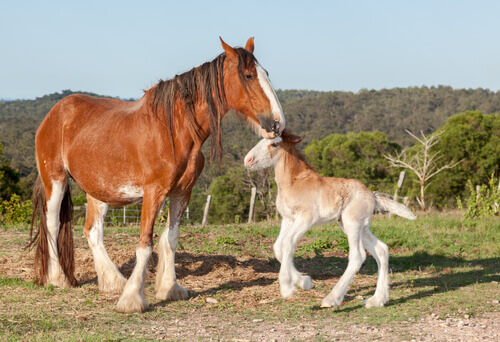A Pregnant Mare: What You Need to Know


Written and verified by the lawyer Francisco María García
A pregnant mare requires special attention and care to ensure that both it and the fetus stay healthy. Generally, you need to pay a lot of attention to the mare’s diet and deworming.
Mares begin to come into heat in the spring. Until the arrival of summer, the mare is likely to exhibit symptoms of heat every three weeks.
If your mare fails to show these symptoms and refuses contact with a male, she’s likely pregnant. Mares don’t usually show noticeable abdominal dilation until three months of gestation. Therefore, you must adopt more specific methods to verify the pregnancy.
In this sense, it’s important to verify the pregnancy early to adopt the appropriate care with the pregnant mare and avoid a miscarriage.
How to know if a mare is pregnant
Currently, it’s possible to choose between chemical and non-chemical methods to confirm that your mare is pregnant.

Professional chemical and non-chemical methods are more reliable. But behavioral non-chemical methods allow anyone to perceive the pregnancy quickly.
Non-chemical behavioral (non-professional) methods
If your mare had contact with a male, you can place it next to another male stallion 14 days later to observe its behavior. If the mare is pregnant, it’ll probably reject the stallion’s approaches.
The second non-professional method is to try to recognize the symptoms of heat in your mare. During this period, the mare lifts its tail, opens and closes its vulva, bends down, and ejects a strong stream of urine or mucus.
A pregnant mare doesn’t usually present symptoms of fertility during pregnancy. Nevertheless, these methods aren’t 100% reliable.
Professional non-chemical methods
Rectal palpation
About 15 days after your mare’s been with a male, the vet can perform a rectal palpation. This test allows them to detect signs of pregnancy in the uterus.
Ultrasound
This is the most reliable non-chemical method. A pregnancy can be detected through ultrasound from the 16th day. Between 60 and 70 days of gestation, the sex of the fetus can be known.
Chemical methods
Blood test
About 45 days after contact with the male, you can detect pregnancy with blood tests. Initially, they measure the pregnant mare serum gonadotropin (PMSG).
Urine test
This is usually complementary to the blood test. It consists of measuring the levels of estrone sulfate in the mare’s urine. You can do it from the 110th day after contact with the male.
In fact, you can even find homemade kits to carry out the test. However, experts recommend laboratory analyses.
Caring for a pregnant mare
In mares, the pregnancy usually lasts 11 months. A pregnant mare can become very vulnerable, putting the foal’s health at risk. Therefore, it’s essential to preserve the mare’s health and condition the environment throughout the gestation period.
Diet and exercise to maintain a healthy weight
A pregnant mare who doesn’t get the proper nutrients, fodder, and hydration can suffer a miscarriage due to malnutrition, dehydration, and other natural causes. In addition, an obese and sedentary mare can present complications during birth.
Thus, you have to reinforce the mare’s daily diet with fibers, proteins, vitamins, and minerals. Likewise, you should provide a moderate amount of carbohydrates to offer the mare energy without increasing its risk of excess weight.
In fact, there are specific commercial feeds for pregnant mares. They’re excellent options to meet their nutritional requirements.

In addition, a standard size mare (60 inches tall/15 hands) should consume 15 pounds of good quality hay every day. If the animal has enough space and good grass, you can reduce the amount of hay.
Your mare should also have access to clean and fresh water throughout the day.
Also, it’s essential to make sure your mare exercises every day. Walking with your mare for 45 minutes at a moderate pace is usually enough to maintain a proper weight.
Deworming and vaccination
Likewise, you have to make sure to keep up with your mare’s vaccinations and deworm it from time to time. Among other things, this allows the mare to transmit the necessary antibodies to the foal.
In the last month of gestation, it’s essential to deworm your mare and supply the corresponding vaccines.
Be careful with contact with unknown horses! This is because the mare can become infected with the rhinovirus by being around infected horses.
Also, regular veterinary visits are essential to monitor the health of the pregnant mare.
A pregnant mare requires special attention and care to ensure that both it and the fetus stay healthy. Generally, you need to pay a lot of attention to the mare’s diet and deworming.
Mares begin to come into heat in the spring. Until the arrival of summer, the mare is likely to exhibit symptoms of heat every three weeks.
If your mare fails to show these symptoms and refuses contact with a male, she’s likely pregnant. Mares don’t usually show noticeable abdominal dilation until three months of gestation. Therefore, you must adopt more specific methods to verify the pregnancy.
In this sense, it’s important to verify the pregnancy early to adopt the appropriate care with the pregnant mare and avoid a miscarriage.
How to know if a mare is pregnant
Currently, it’s possible to choose between chemical and non-chemical methods to confirm that your mare is pregnant.

Professional chemical and non-chemical methods are more reliable. But behavioral non-chemical methods allow anyone to perceive the pregnancy quickly.
Non-chemical behavioral (non-professional) methods
If your mare had contact with a male, you can place it next to another male stallion 14 days later to observe its behavior. If the mare is pregnant, it’ll probably reject the stallion’s approaches.
The second non-professional method is to try to recognize the symptoms of heat in your mare. During this period, the mare lifts its tail, opens and closes its vulva, bends down, and ejects a strong stream of urine or mucus.
A pregnant mare doesn’t usually present symptoms of fertility during pregnancy. Nevertheless, these methods aren’t 100% reliable.
Professional non-chemical methods
Rectal palpation
About 15 days after your mare’s been with a male, the vet can perform a rectal palpation. This test allows them to detect signs of pregnancy in the uterus.
Ultrasound
This is the most reliable non-chemical method. A pregnancy can be detected through ultrasound from the 16th day. Between 60 and 70 days of gestation, the sex of the fetus can be known.
Chemical methods
Blood test
About 45 days after contact with the male, you can detect pregnancy with blood tests. Initially, they measure the pregnant mare serum gonadotropin (PMSG).
Urine test
This is usually complementary to the blood test. It consists of measuring the levels of estrone sulfate in the mare’s urine. You can do it from the 110th day after contact with the male.
In fact, you can even find homemade kits to carry out the test. However, experts recommend laboratory analyses.
Caring for a pregnant mare
In mares, the pregnancy usually lasts 11 months. A pregnant mare can become very vulnerable, putting the foal’s health at risk. Therefore, it’s essential to preserve the mare’s health and condition the environment throughout the gestation period.
Diet and exercise to maintain a healthy weight
A pregnant mare who doesn’t get the proper nutrients, fodder, and hydration can suffer a miscarriage due to malnutrition, dehydration, and other natural causes. In addition, an obese and sedentary mare can present complications during birth.
Thus, you have to reinforce the mare’s daily diet with fibers, proteins, vitamins, and minerals. Likewise, you should provide a moderate amount of carbohydrates to offer the mare energy without increasing its risk of excess weight.
In fact, there are specific commercial feeds for pregnant mares. They’re excellent options to meet their nutritional requirements.

In addition, a standard size mare (60 inches tall/15 hands) should consume 15 pounds of good quality hay every day. If the animal has enough space and good grass, you can reduce the amount of hay.
Your mare should also have access to clean and fresh water throughout the day.
Also, it’s essential to make sure your mare exercises every day. Walking with your mare for 45 minutes at a moderate pace is usually enough to maintain a proper weight.
Deworming and vaccination
Likewise, you have to make sure to keep up with your mare’s vaccinations and deworm it from time to time. Among other things, this allows the mare to transmit the necessary antibodies to the foal.
In the last month of gestation, it’s essential to deworm your mare and supply the corresponding vaccines.
Be careful with contact with unknown horses! This is because the mare can become infected with the rhinovirus by being around infected horses.
Also, regular veterinary visits are essential to monitor the health of the pregnant mare.
This text is provided for informational purposes only and does not replace consultation with a professional. If in doubt, consult your specialist.








